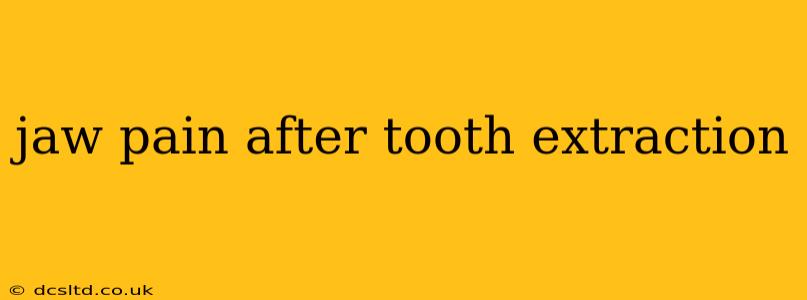Experiencing jaw pain after a tooth extraction is a common occurrence, and while usually temporary, it can be quite uncomfortable. Understanding the causes, effective treatment options, and preventative measures can significantly improve your post-extraction experience. This comprehensive guide will address common concerns and provide you with the information you need for a smoother recovery.
What Causes Jaw Pain After Tooth Extraction?
Jaw pain following a tooth extraction stems from several factors, often intertwined:
- Inflammation: The extraction site naturally undergoes inflammation as part of the healing process. This inflammation can spread to the surrounding tissues, including the jaw muscles and temporomandibular joint (TMJ), resulting in pain and stiffness.
- Muscle Strain: The procedure itself, along with the subsequent recovery period (which may involve keeping your mouth open for a prolonged period during the procedure, and the subsequent discomfort), can strain the jaw muscles. This strain manifests as pain and soreness.
- Nerve Irritation: In some cases, the extraction process may cause temporary irritation to nearby nerves. This irritation can lead to referred pain in the jaw and surrounding areas. This is usually temporary.
- Dry Socket (Alveolar Osteitis): This complication occurs when the blood clot protecting the extraction site dislodges or dissolves prematurely. This exposes the underlying bone and nerve endings, causing intense pain that often radiates to the jaw. This is a serious complication and requires immediate professional attention.
- Existing TMJ Disorder: Individuals with pre-existing temporomandibular joint (TMJ) disorders may experience exacerbated jaw pain after an extraction, as the procedure can put additional stress on the joint.
- Sinus Issues (Upper Teeth Extractions): Extractions of upper teeth, especially molars, can sometimes lead to sinus complications and resulting jaw pain.
How Long Does Jaw Pain After Tooth Extraction Last?
The duration of jaw pain varies considerably depending on the complexity of the extraction, individual healing rates, and the presence of any complications. Mild discomfort typically subsides within a few days to a week. However, more severe pain or pain lasting longer than a week warrants a follow-up appointment with your dentist or oral surgeon.
What Can I Do to Relieve Jaw Pain After Tooth Extraction?
Several effective strategies can help manage jaw pain after a tooth extraction:
- Over-the-Counter Pain Relievers: Ibuprofen or naproxen (NSAIDs) are generally recommended for pain and inflammation management. Follow the dosage instructions carefully.
- Ice Packs: Applying ice packs to the affected area for 15-20 minutes at a time, several times a day, can help reduce swelling and numb the pain.
- Rest: Adequate rest is crucial for proper healing. Avoid strenuous activities and get plenty of sleep.
- Soft Food Diet: Stick to a soft food diet for the first few days to avoid putting undue stress on the extraction site.
- Gentle Rinsing: Rinse your mouth gently with saltwater (1/2 teaspoon salt in 8 ounces of warm water) several times a day to keep the area clean and promote healing. Avoid vigorous rinsing or spitting.
Is Jaw Pain After Tooth Extraction Normal?
Some level of jaw pain is considered normal in the immediate aftermath of a tooth extraction. However, the intensity and duration of the pain should be monitored. Severe, persistent, or worsening pain is not normal and requires prompt professional attention.
When Should I See a Dentist About Jaw Pain After Tooth Extraction?
Contact your dentist or oral surgeon immediately if you experience:
- Severe or persistent pain that isn't relieved by over-the-counter pain medication.
- Increased swelling or redness around the extraction site.
- Signs of infection, such as fever, pus, or foul-smelling discharge.
- Difficulty opening your mouth or experiencing jaw stiffness.
- Numbness or tingling in your jaw or face.
Can Jaw Pain After Tooth Extraction Be Prevented?
While some jaw pain is unavoidable, you can take steps to minimize the risk:
- Follow Post-Extraction Instructions: Meticulously follow your dentist's or oral surgeon's post-operative instructions.
- Maintain Good Oral Hygiene: Practicing good oral hygiene before and after the extraction can significantly reduce the risk of infection and complications.
- Choose an Experienced Professional: Selecting an experienced and reputable dentist or oral surgeon can help minimize the risk of complications during and after the procedure.
This information is for general knowledge and does not constitute medical advice. Always consult with a qualified dental professional for diagnosis and treatment of any dental concerns. They can provide personalized recommendations based on your individual needs and circumstances.
